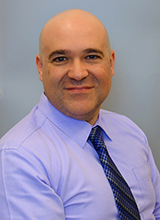Personal Statement
My primary interests are Nutrition and Lifestyle Psychiatry, Cultural Psychiatry and the interface of Religion and Spirituality with Psychiatry. I love guiding patients to achieve healing using a domains of health approach- addressing Nutrition, Sleep, Relaxation, Movement and Connectedness/ Purpose.

Personal Statement
My clinical interests include diagnosis and psychopharmacology of complex mood and anxiety disorders and psychosis. My research program investigates the molecular neuroscience of behavior using animal models with a focus on the involvement of the serotonin system and the neurocircuitry and plasticity involved in stress and addiction.
My lab uses rat and mouse models to investigate stress and addiction mechanisms. The lab is unusual because we pursue a very broad range of methods, including molecular, cellular, neuroanatomical, and behavioral levels of organization. We have focused on serotonin receptors historically but increasingly we are using novel molecular and genetic tools to dissect the involvement of key neural circuits in behavioral models of stress and/or addiction.
The main strategies include a range of behavioral models, intersectional transgenic and viral-mediated gene transfer manipulations of gene expression, neuropharmacology, engineered receptors (DREADDs), fiber photometry, calcium imaging, two-photon microscopy, RNAseq and RTqPCR (using RiboTag pull-down). We are trying to push the envelope in developing and using methods that allow us very precise manipulations or readouts from specific pathways such as the projections from nucleus accumbens to ventral tegmentum or lateral habenula to dorsal raphe nucleus. We are also exploring the role of microglia, the innate immune cells in the brain, during early stages of drug and alcohol withdrawal in advance of typical activation of neuroinflammation.

Personal Statement
I am a licensed clinical psychologist in Washington State. I am the Director of the University of Washington School of Medicine’s Psychology Internship Program which is accredited by the American Psychological Association’s Office of Program Consultation and Accreditation. And, I conduct research on health and risk behaviors across the lifespan. Specifically, I have conducted research in the areas of college student alcohol use, young adult gambling behavior, and co-morbidity of substance use and mental health/risk behaviors (i.e. risky sexual behaviors). I have extensive experience working with college students/young adults, military/veteran, and minority/diverse populations. I am also interested in mental health issues including depression, anxiety, and PTSD. I maintain an active clinical practice in the areas of mental health issues with patients diagnosed with hematological and oncological illness and have clinical responsibilities at the Fred Hutchinson Cancer Center. I also provide clinical supervision for psychology residents and psychology practicum students at Fred Hutchinson Cancer Center as well. Overall, my professional aspirations are to improve the public health through empirically-supported psychological interventions and providing mentorship to diverse trainees to expand the reach of psychology.

Personal Statement
Dr. Bedard-Gilligan is a Professor in the Department of Psychiatry and Behavioral Sciences and a licensed clinical psychologist in the state of Washington. She currently serves as the co-director of the Trauma Recovery & Resilience Innovations (TRI) group and the associate director of the UW Center for Anxiety and Traumatic Stress (UWCATS). She leads or co-leads several research projects that are funded by the National Institute of Mental Health Disparities, the National Institute of Alcohol Abuse and Alcoholism, and the National Institute of Drug Abuse.
Her research is applied in nature and predominantly focuses on posttraumatic stress disorder (PTSD), with specific emphases on the co-occurrence of PTSD and substance use disorders and on mechanisms of treatment and recovery. She has presented her research at national conferences and has published numerous articles in peer-reviewed journals. She also maintains an active clinical practice specializing in using empirically supported treatments for PTSD and other anxiety disorders at the University of Washington Outpatient Psychiatry Clinic. Additionally, Dr. Bedard-Gilligan is involved in training and supervising psychology graduate students, psychology residents, and psychiatry residents in the use of empirically supported cognitive behavioral treatments.




